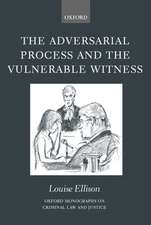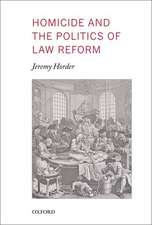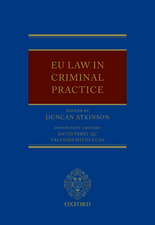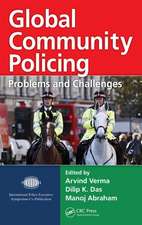Bar Wars: Contesting the Night in Contemporary British Cities: Clarendon Studies in Criminology
Autor Phil Hadfielden Limba Engleză Hardback – 25 mai 2006
| Toate formatele și edițiile | Preț | Express |
|---|---|---|
| Paperback (1) | 196.38 lei 31-37 zile | |
| OUP OXFORD – 25 mai 2006 | 196.38 lei 31-37 zile | |
| Hardback (1) | 413.86 lei 31-37 zile | |
| OUP OXFORD – 25 mai 2006 | 413.86 lei 31-37 zile |
Din seria Clarendon Studies in Criminology
- 30%
 Preț: 524.88 lei
Preț: 524.88 lei - 27%
 Preț: 539.99 lei
Preț: 539.99 lei - 30%
 Preț: 597.87 lei
Preț: 597.87 lei - 30%
 Preț: 539.03 lei
Preț: 539.03 lei - 30%
 Preț: 540.50 lei
Preț: 540.50 lei - 30%
 Preț: 518.78 lei
Preț: 518.78 lei - 30%
 Preț: 598.35 lei
Preț: 598.35 lei - 30%
 Preț: 521.83 lei
Preț: 521.83 lei - 30%
 Preț: 538.41 lei
Preț: 538.41 lei - 30%
 Preț: 537.95 lei
Preț: 537.95 lei - 30%
 Preț: 539.99 lei
Preț: 539.99 lei - 28%
 Preț: 499.76 lei
Preț: 499.76 lei - 30%
 Preț: 539.57 lei
Preț: 539.57 lei - 27%
 Preț: 500.43 lei
Preț: 500.43 lei - 19%
 Preț: 674.36 lei
Preț: 674.36 lei - 30%
 Preț: 659.34 lei
Preț: 659.34 lei - 30%
 Preț: 838.79 lei
Preț: 838.79 lei - 27%
 Preț: 658.11 lei
Preț: 658.11 lei - 28%
 Preț: 496.73 lei
Preț: 496.73 lei - 25%
 Preț: 561.63 lei
Preț: 561.63 lei - 28%
 Preț: 424.05 lei
Preț: 424.05 lei - 31%
 Preț: 395.73 lei
Preț: 395.73 lei - 34%
 Preț: 579.34 lei
Preț: 579.34 lei - 14%
 Preț: 196.70 lei
Preț: 196.70 lei - 34%
 Preț: 600.54 lei
Preț: 600.54 lei - 30%
 Preț: 521.22 lei
Preț: 521.22 lei - 18%
 Preț: 339.31 lei
Preț: 339.31 lei - 19%
 Preț: 253.88 lei
Preț: 253.88 lei - 15%
 Preț: 395.89 lei
Preț: 395.89 lei - 34%
 Preț: 574.69 lei
Preț: 574.69 lei - 18%
 Preț: 301.83 lei
Preț: 301.83 lei - 34%
 Preț: 560.12 lei
Preț: 560.12 lei - 32%
 Preț: 466.28 lei
Preț: 466.28 lei - 34%
 Preț: 498.34 lei
Preț: 498.34 lei - 34%
 Preț: 522.00 lei
Preț: 522.00 lei - 30%
 Preț: 503.29 lei
Preț: 503.29 lei - 34%
 Preț: 629.61 lei
Preț: 629.61 lei - 19%
 Preț: 566.42 lei
Preț: 566.42 lei - 9%
 Preț: 252.66 lei
Preț: 252.66 lei - 13%
 Preț: 167.56 lei
Preț: 167.56 lei - 31%
 Preț: 486.45 lei
Preț: 486.45 lei - 34%
 Preț: 633.17 lei
Preț: 633.17 lei - 30%
 Preț: 538.24 lei
Preț: 538.24 lei - 10%
 Preț: 270.63 lei
Preț: 270.63 lei - 31%
 Preț: 401.95 lei
Preț: 401.95 lei - 28%
 Preț: 473.39 lei
Preț: 473.39 lei
Preț: 413.86 lei
Preț vechi: 601.53 lei
-31% Nou
Puncte Express: 621
Preț estimativ în valută:
79.19€ • 82.68$ • 65.54£
79.19€ • 82.68$ • 65.54£
Carte tipărită la comandă
Livrare economică 25-31 martie
Preluare comenzi: 021 569.72.76
Specificații
ISBN-13: 9780199297856
ISBN-10: 0199297851
Pagini: 344
Dimensiuni: 146 x 224 x 24 mm
Greutate: 0.53 kg
Editura: OUP OXFORD
Colecția OUP Oxford
Seria Clarendon Studies in Criminology
Locul publicării:Oxford, United Kingdom
ISBN-10: 0199297851
Pagini: 344
Dimensiuni: 146 x 224 x 24 mm
Greutate: 0.53 kg
Editura: OUP OXFORD
Colecția OUP Oxford
Seria Clarendon Studies in Criminology
Locul publicării:Oxford, United Kingdom
Recenzii
Hadfield's analysis of licensing procedure was both original and remarkably insightful, and points the way for further ethnographic work on licensing trials, given their huge potential to shape strategy at the local and national levels
Hadfield provides a powerful critique of the existing licensing system and its inability to reflect on, and respond to, evidence relating to criminality in licensed spaces. His conclusion that an inquisitorial mode of licensing hearing would lead to fairer and more representative licensing decisions is unquestionable
Phil Hadfield is a prolific and highly engaging writer on Britain's night-time economy...Bar Wars is a highly recommended tour-de-force
Hadfield systematically unpicks the minutiae of the historical, social, cultural, economic and legal forces which have shaped our contemporary urban spaces at night, and opens up intellectual space for further critical engagement with the consequences of, and possible alternatives to, the commercialisation of British high streets.
As public health and public order concerns around British alcohol consumption continue, carefully researched, theoretically innovative, considered accounts of Britain's night-time economy such as Bar Wars are much needed by those seeking to understand how we find ourselves in this drink-sodden, vomit-splattered mess, and how we may, if not get out of it, at least minimise its harmful effects
An insider's view of the exploitative and occasionally ruthless underbelly of the licensed venues that populate the British 'high-street'The power plays, the striking of deals, competition for prized locations and the stockpiling of transferable licenses, summon up images of a giant game of monopoly played out on real streets with real hotels and really big dollars(the author) leaves us in no doubt of his authenticity and personal credentials for writing this bookTimely, intelligently written, supported by insight from personal experience - but tempered with academic rigour -Bar Wars is recommended reading for anyone interested in the inexorable and complex relations between the late-night drinking environment, crime, regulation, governance and policy
A useful contribution to the relatively scant canon of literature on the role and importance of licensing and the Night-time Economy. It is not a legal text and is fairly critical of lawyers. As a result it forces the legal reader to reconsider some of his or her own views and prejudices when one sees the legal profession and process under scrutiny by a non-legal academic observerI would recommend this book to anyone interested in licensing law
With all-night drinking two years old last November, you might like to invest your beer money in a copy of Bar Wars, OUP's excellent new study of the night-time economy in British cities
Hadfield provides a powerful critique of the existing licensing system and its inability to reflect on, and respond to, evidence relating to criminality in licensed spaces. His conclusion that an inquisitorial mode of licensing hearing would lead to fairer and more representative licensing decisions is unquestionable
Phil Hadfield is a prolific and highly engaging writer on Britain's night-time economy...Bar Wars is a highly recommended tour-de-force
Hadfield systematically unpicks the minutiae of the historical, social, cultural, economic and legal forces which have shaped our contemporary urban spaces at night, and opens up intellectual space for further critical engagement with the consequences of, and possible alternatives to, the commercialisation of British high streets.
As public health and public order concerns around British alcohol consumption continue, carefully researched, theoretically innovative, considered accounts of Britain's night-time economy such as Bar Wars are much needed by those seeking to understand how we find ourselves in this drink-sodden, vomit-splattered mess, and how we may, if not get out of it, at least minimise its harmful effects
An insider's view of the exploitative and occasionally ruthless underbelly of the licensed venues that populate the British 'high-street'The power plays, the striking of deals, competition for prized locations and the stockpiling of transferable licenses, summon up images of a giant game of monopoly played out on real streets with real hotels and really big dollars(the author) leaves us in no doubt of his authenticity and personal credentials for writing this bookTimely, intelligently written, supported by insight from personal experience - but tempered with academic rigour -Bar Wars is recommended reading for anyone interested in the inexorable and complex relations between the late-night drinking environment, crime, regulation, governance and policy
A useful contribution to the relatively scant canon of literature on the role and importance of licensing and the Night-time Economy. It is not a legal text and is fairly critical of lawyers. As a result it forces the legal reader to reconsider some of his or her own views and prejudices when one sees the legal profession and process under scrutiny by a non-legal academic observerI would recommend this book to anyone interested in licensing law
With all-night drinking two years old last November, you might like to invest your beer money in a copy of Bar Wars, OUP's excellent new study of the night-time economy in British cities
Notă biografică
Phil Hadfield is a Lecturer in the Department of Sociology at the University of York. His main areas of research include nightlife and crime, alcohol policy, workplace violence, policing, urban sociology, and symbolic interactionism. Recent publications include Bouncers: Violence and Governance in the Night-time Economy, (OUP, 2003) and 'Door Lore': The Art and Economics of Intimidation,' British Journal of Criminology, 42/2, 352-370 (winner of the Radzinowicz Memorial Prize 2002), both with Dick Hobbs, Stuart Lister and Simon Winlow.















